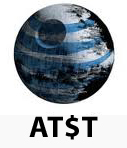Why the AT&T deal can’t be good for T-Mobile consumers: Pay double to get half
April 11th, 2011 by jeremychone|
If you are a T-Mobile consumer, here are three things that will happen over time (and yes, the carry-over deal is just a gimmick, as I will explain later). |
1) Your wireless bill will almost double
T-Mobile $79.99 unlimited everything –> AT&T $134.99 capped at 4GB (i.e., no movies)
This is going to hurt. Today, I pay $79.99/month for unlimited everything. I can have any phone I want and use anything I want. No restrictions. Tomorrow, AT&T will find a way to force us to move to their plan, and we will have to pay $134.99 for lesser service (i.e., capped service).
Doubling the monthly bill cannot be good for consumers.
2) Your Internet use will be capped
AT&T is very aggressive at capping its subscribers’ Internet usage (wireless and wired). In the wired world, we still have some alternatives. I am using Sonic.net, but, in the GSM world, after this acquisition, we will be limited to only one carrier, which caps its Internet usage strictly despite charging more for it.
So, today, I have unlimited everything with T-Mobile but, tomorrow, with AT&T, my Internet usage will be capped at 4GB despite paying almost double for it. 4GB is very little if you plan to tether or even to watch video on your mobile device. So, with AT&T Wireless, you cannot watch HD-video streaming to your mobile or tablet device.
Update: T-mobile apparently throttles internet after 5GB to something around 5K/sec (see HN comment). In my opinion, T-Mobile options is a much better option than capping the usage at 4GB
Capping the Internet cannot be good for the consumer.
3) You will be locked in
T-Mobile offers month-to-month usage and allows you to use any phone.
AT&T tends to tie the phone to their plan very closely. You can pick a sim-card only option, but even then, AT&T requires you to give the IMEI number for the phone you are using.
Forcing users to tie their phone to their network cannot be good for the consumer. The GSM promise was to decouple the device from the network.
Why honoring T-Mobile’s old contracts will not work
Now, I can hear the AT&T/T-Mobile acquisition optimists saying, “AT&T said that they will honor T-mobile contracts, so T-Mobile users should be happy.”
Well, this is just a gimmick and it won’t work.
First, after the acquisition the better and cheaper T-Mobile plans will cease to exist. So, yes, existing T-Mobile consumers might carry over their contract (at least for a while), but, at some point, they will need more or something different, and the only option will be to pay more to get less.
Second, AT&T’s 3G and 4G bands are different from those of T-Mobile, and I would bet that AT&T will use this technical difference to force T-Mobile users to move to AT&T plans. In other words, when a T-Mobile user wants to get an iPhone or enjoy the latest network bandwidth performance AT&T will gently suggest (i.e. force) the user to move to an AT&T plan (the pay more to get less plan).
The sad part is that, I think, despite all these facts, AT&T and T-Mobile shareholders might genuinely think that this deal will be good for T-Mobile consumers, and consequently, our only only hope is that our government put a stop to this proposed new monopoly. AT&T Wireless will have a GSM wireless monopoly in the U.S.A., and that cannot be good for the American people and businesses. Everybody will pay more to get less.
If you liked this post, a +1 on HN or a reTweet is greatly appreciated
 I am not sure if Randall Stephenson, CEO of AT&T, was misinformed, dishonest, or just carried away with his new crusade when
I am not sure if Randall Stephenson, CEO of AT&T, was misinformed, dishonest, or just carried away with his new crusade when